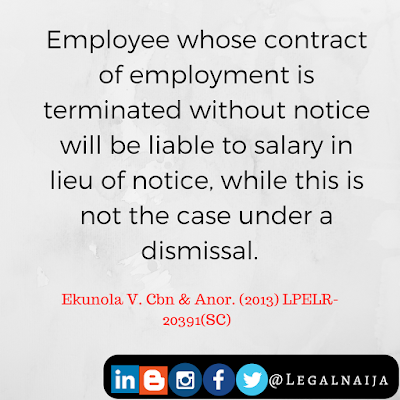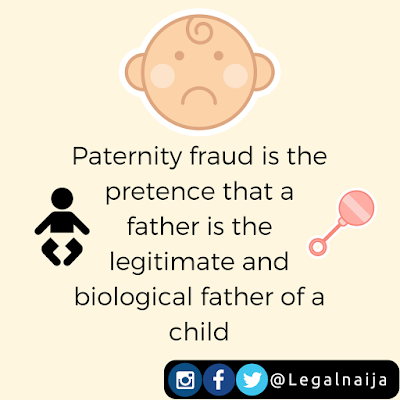
Overview of the Legal requirements for revocation of certificate of occupancy in Nigeria | Teingo Inko-Tariah

Introduction
A certificate of occupancy is a document
that evidences the grant of a right of occupancy over land in Nigeria given by
the appropriate authority i.e. the Governor of a State[i]. The
Constitution of Nigeria provides that every citizen of Nigeria has a right to
acquire and own immovable property in Nigeria[ii]. However, such
acquisition and ownership of land is regulated by the principal statute for the
administration of land in Nigeria – Land Use Act (LUA) of 1978. All laws
relating to registration of title to or interest in land or transfer of title
or interest are required to comply with the Land Use Act[iii].
By the provision of the said Act, all land in each state of the Federation is
vested in the Governor of that State who is empowered to hold such land in
trust and administer same for the benefit of all Nigerians.[iv]
that evidences the grant of a right of occupancy over land in Nigeria given by
the appropriate authority i.e. the Governor of a State[i]. The
Constitution of Nigeria provides that every citizen of Nigeria has a right to
acquire and own immovable property in Nigeria[ii]. However, such
acquisition and ownership of land is regulated by the principal statute for the
administration of land in Nigeria – Land Use Act (LUA) of 1978. All laws
relating to registration of title to or interest in land or transfer of title
or interest are required to comply with the Land Use Act[iii].
By the provision of the said Act, all land in each state of the Federation is
vested in the Governor of that State who is empowered to hold such land in
trust and administer same for the benefit of all Nigerians.[iv]
It is worth noting that the concept of
ownership in the sense of absolute dominion does not apply with regards to land[v] because
the right to convey/transfer title which is a fundamental ingredient of
ownership is subjected to the consent of the Governor thus, qualifying the
ownership of land. The nature of the title that is usually acquired over land
is that of a right of occupancy i.e. the right to lawfully use and occupy land.
A right of occupancy could either be ‘statutory’ in which case it will granted
by the Governor over land in urban and non-urban areas[vi]; or
‘Customary’, in which case, it will be over land in areas other than urban
areas[vii] and
granted by the relevant Local Government Authority[viii].
ownership in the sense of absolute dominion does not apply with regards to land[v] because
the right to convey/transfer title which is a fundamental ingredient of
ownership is subjected to the consent of the Governor thus, qualifying the
ownership of land. The nature of the title that is usually acquired over land
is that of a right of occupancy i.e. the right to lawfully use and occupy land.
A right of occupancy could either be ‘statutory’ in which case it will granted
by the Governor over land in urban and non-urban areas[vi]; or
‘Customary’, in which case, it will be over land in areas other than urban
areas[vii] and
granted by the relevant Local Government Authority[viii].
A certificate of occupancy is usually
granted for a term of 99 years subject to renewal[ix]. The
certificate would clearly state the terms and conditions of the grant[x] and
where the holder of such certificate of occupancy fails to comply with the
stated terms, the certificate of occupancy could be revoked or the holder may
be penalized.[xi] The
holder of a right of occupancy over land is prohibited by law from parting with
any portion of the land granted to him by way of mortgage, transfer of
possession, assignment, sub-lease or any other manner without first obtaining
consent to do so from the Governor[xii].
Any transaction which purports to transfer any interest or right over land in
Nigeria without complying with the provisions of the LUA shall be null and void[xiii].
granted for a term of 99 years subject to renewal[ix]. The
certificate would clearly state the terms and conditions of the grant[x] and
where the holder of such certificate of occupancy fails to comply with the
stated terms, the certificate of occupancy could be revoked or the holder may
be penalized.[xi] The
holder of a right of occupancy over land is prohibited by law from parting with
any portion of the land granted to him by way of mortgage, transfer of
possession, assignment, sub-lease or any other manner without first obtaining
consent to do so from the Governor[xii].
Any transaction which purports to transfer any interest or right over land in
Nigeria without complying with the provisions of the LUA shall be null and void[xiii].
Circumstances under which right of
occupancy may be revoked.
occupancy may be revoked.
A right of occupancy may be revoked by the
Governor in accordance with the provisions of the Land Use Act and the law
provides the circumstances under which the right of occupancy over land may be
revoked as well as the procedure to be followed. A right of occupancy may be
revoked for overriding public interest[xiv].
The term ‘overriding public interest’ has been clearly defined by the law as
follows[xv]:
Governor in accordance with the provisions of the Land Use Act and the law
provides the circumstances under which the right of occupancy over land may be
revoked as well as the procedure to be followed. A right of occupancy may be
revoked for overriding public interest[xiv].
The term ‘overriding public interest’ has been clearly defined by the law as
follows[xv]:
a) Where
the holder of a statutory right of occupancy parts with the land in any manner
contrary to the law or other regulatory provisions;
the holder of a statutory right of occupancy parts with the land in any manner
contrary to the law or other regulatory provisions;
b) Where
the land over which statutory right of occupancy is granted is required by the
State or Federal Government for public purposes[xvi]
the land over which statutory right of occupancy is granted is required by the
State or Federal Government for public purposes[xvi]
c) Where
the land over which a statutory right of occupancy is granted is required for
oil pipeline or any related purpose;
the land over which a statutory right of occupancy is granted is required for
oil pipeline or any related purpose;
d) Where
the holder of a customary right of occupancy parts with the said land without
the requisite consent;
the holder of a customary right of occupancy parts with the said land without
the requisite consent;
e) Where
the land over which customary right of occupancy is granted is required by the
Federal or State Government for public purpose
the land over which customary right of occupancy is granted is required by the
Federal or State Government for public purpose
f) Where
the land over which customary right of occupancy is granted is required for
mining purposes, oil pipeline or related purposes; or for the extraction of
building materials;
the land over which customary right of occupancy is granted is required for
mining purposes, oil pipeline or related purposes; or for the extraction of
building materials;
g) Breach
of any provisions or any term contained in the certificate of occupancy or any
special contract made in accordance with the law in relation to the grant of
the right of occupancy;
of any provisions or any term contained in the certificate of occupancy or any
special contract made in accordance with the law in relation to the grant of
the right of occupancy;
h) Refusal
to accept to pay for certificate of occupancy granted by the Governor.
to accept to pay for certificate of occupancy granted by the Governor.
Note that the law does not give the
Governor any additional discretionary powers to determine what constitutes
‘overriding public interest’. However, since the inception of the Land Use Act
in 1978, there have been cases of abuse of powers by Governors and Military
administrators in the exercise of their lawful authority to revoke a right of
occupancy. In the case of C.S.S Bookshops Ltd v. The Registered Trustees
of Muslim Community in Rivers State & Others[xvii] the
Supreme Court held that the revocation of the Appellant’s right of occupancy
was wrongful as it did not comply with the provisions of S. 28 of the Land Use
Act. In that case, Mohammed JSC delivering the lead judgement held as follows:
Governor any additional discretionary powers to determine what constitutes
‘overriding public interest’. However, since the inception of the Land Use Act
in 1978, there have been cases of abuse of powers by Governors and Military
administrators in the exercise of their lawful authority to revoke a right of
occupancy. In the case of C.S.S Bookshops Ltd v. The Registered Trustees
of Muslim Community in Rivers State & Others[xvii] the
Supreme Court held that the revocation of the Appellant’s right of occupancy
was wrongful as it did not comply with the provisions of S. 28 of the Land Use
Act. In that case, Mohammed JSC delivering the lead judgement held as follows:
“It is not at all in doubt that
the provisions of section 28 of the Act contains comprehensive provisions to
guide the Governor of a State in the exercise of his vast powers of control of
land within the territorial areas of his State particularly the power of
revocation of a right of occupancy. One of the preconditions for the exercise
of this power of revocation is that it must be shown clearly to be for
overriding public interest. In order not to leave the Governor in any doubt as
to the conditions for the exercise of his powers, the law went further to
provide adequate guidance by defining in clear terms what overriding public
interest means in the case of a statutory right of occupancy under the Act in
subsection (2) of section 28. What this means of course is obvious. Any
revocation of a right of occupancy by the Governor in exercise of powers under
the Act must be within the confine of the provisions of section 28 of the Act.
Consequently, any exercise of this power of revocation for purposes outside
those outlined or enumerated by section 28 of the Act or not carried out in
compliance with provisions of the section, can be regarded as being against the
policy and intention of the Land Use Act resulting in the exercise of the power
being declared invalid, null and void by a competent court in exercise of its
jurisdiction on a complaint by an aggrieved party. See Osho v. Foreign Finance
Corporation (1991) 4 NWLR (Pt.184) 157; Olohunde v. Adeyoju (2000) 10 NWLR
(Pt.676) 562; Dantsoho v. Mohammed (2003) 6 NWLR (Pt.817) 457 at 483”
the provisions of section 28 of the Act contains comprehensive provisions to
guide the Governor of a State in the exercise of his vast powers of control of
land within the territorial areas of his State particularly the power of
revocation of a right of occupancy. One of the preconditions for the exercise
of this power of revocation is that it must be shown clearly to be for
overriding public interest. In order not to leave the Governor in any doubt as
to the conditions for the exercise of his powers, the law went further to
provide adequate guidance by defining in clear terms what overriding public
interest means in the case of a statutory right of occupancy under the Act in
subsection (2) of section 28. What this means of course is obvious. Any
revocation of a right of occupancy by the Governor in exercise of powers under
the Act must be within the confine of the provisions of section 28 of the Act.
Consequently, any exercise of this power of revocation for purposes outside
those outlined or enumerated by section 28 of the Act or not carried out in
compliance with provisions of the section, can be regarded as being against the
policy and intention of the Land Use Act resulting in the exercise of the power
being declared invalid, null and void by a competent court in exercise of its
jurisdiction on a complaint by an aggrieved party. See Osho v. Foreign Finance
Corporation (1991) 4 NWLR (Pt.184) 157; Olohunde v. Adeyoju (2000) 10 NWLR
(Pt.676) 562; Dantsoho v. Mohammed (2003) 6 NWLR (Pt.817) 457 at 483”
Where a right of occupancy is revoked, the
holder will be entitled to compensation in accordance with the law based on the
value of the unexhausted improvements made to the land. Compensation would
depend on the reason for revocation and may take the form of resettlement in
any other place or area by way of reasonable alternative[xviii].
Note that compensation has nothing to do with the current market value of the
land as the land is not ‘owned’ by the occupier as hinted above. The payment of
annual ground rent further buttresses this point.
holder will be entitled to compensation in accordance with the law based on the
value of the unexhausted improvements made to the land. Compensation would
depend on the reason for revocation and may take the form of resettlement in
any other place or area by way of reasonable alternative[xviii].
Note that compensation has nothing to do with the current market value of the
land as the land is not ‘owned’ by the occupier as hinted above. The payment of
annual ground rent further buttresses this point.
Procedure
for revocation of a right of occupancy/certificate of occupancy
for revocation of a right of occupancy/certificate of occupancy
Revocation of a right of occupancy is
executed by sending a notice to that effect to the holder of the right of
occupancy. The notice is required to be signed by a public officer duly
authorized by the Governor[xix] and
the title of the holder of right of occupancy will cease once the notice is
received by him or on any other date stated in the notice[xx].
The law requires any notice to the holder of a right of occupancy to be served
on the person in any of the following ways[xxi]:
executed by sending a notice to that effect to the holder of the right of
occupancy. The notice is required to be signed by a public officer duly
authorized by the Governor[xix] and
the title of the holder of right of occupancy will cease once the notice is
received by him or on any other date stated in the notice[xx].
The law requires any notice to the holder of a right of occupancy to be served
on the person in any of the following ways[xxi]:
a)
By
delivery to the holder personally;
By
delivery to the holder personally;
b) By
leaving at the usual or last known place of abode of the holder;
leaving at the usual or last known place of abode of the holder;
c) By
sending via prepaid registered post addressed to the holder at his usual or
last known place of abode;
sending via prepaid registered post addressed to the holder at his usual or
last known place of abode;
d) In
the case of a corporate entity or company, by delivery to the company secretary
or clerk or by sending via prepaid registered post addressed to the registered
or principal office or by sending in a prepaid registered letter addressed to
the secretary or clerk of the company;
the case of a corporate entity or company, by delivery to the company secretary
or clerk or by sending via prepaid registered post addressed to the registered
or principal office or by sending in a prepaid registered letter addressed to
the secretary or clerk of the company;
e) Where
it is not practicable to ascertain the name and address of the holder or
occupier of land then the notice may be addressed to the person as “holder” or
“occupier” and by delivery to a person on the premises. Where there is no one
on the premises to take delivery of notice then it may be affixed on a
conspicuous part of the premises.
it is not practicable to ascertain the name and address of the holder or
occupier of land then the notice may be addressed to the person as “holder” or
“occupier” and by delivery to a person on the premises. Where there is no one
on the premises to take delivery of notice then it may be affixed on a
conspicuous part of the premises.
In C.S.S Bookshops Ltd v. The
Registered Trustees of Muslim Community in Rivers State & Others it
was held that publication in a gazette was not one of the methods of notification
provided under the Land Use Act and therefore such notification was invalid.
Again the decision of the Court per Mohammed JSC is worthy of reproduction as
follows:
Registered Trustees of Muslim Community in Rivers State & Others it
was held that publication in a gazette was not one of the methods of notification
provided under the Land Use Act and therefore such notification was invalid.
Again the decision of the Court per Mohammed JSC is worthy of reproduction as
follows:
“From the above it is clear that the
notice of revocation published in the said Rivers State Government Notice No.
235 dated 27th April, 1985 and published in Volume 17, No. 27 of the Official
Gazette was not a valid mode of service in accordance with the Land Use Act.
This is because the mode fell short of the requirement in the Act. There was no
personal service or in this case which is a registered company, there was no
service on the secretary or clerk of the company as provided for. The mode of
service is therefore null and void and of no effect.
I entirely agree with the trial court on this finding on the question of notice
particularly when the 2nd respondent whose powers were being challenged made no
attempt to throw light on the question. The effect of the failure of the 2nd
respondent to serve adequate notice on the appellants as required by the Land
Use Act prior to the revocation of the right of occupancy means the power of
revocation was not exercised in compliance with the provisions of the Act”.
notice of revocation published in the said Rivers State Government Notice No.
235 dated 27th April, 1985 and published in Volume 17, No. 27 of the Official
Gazette was not a valid mode of service in accordance with the Land Use Act.
This is because the mode fell short of the requirement in the Act. There was no
personal service or in this case which is a registered company, there was no
service on the secretary or clerk of the company as provided for. The mode of
service is therefore null and void and of no effect.
I entirely agree with the trial court on this finding on the question of notice
particularly when the 2nd respondent whose powers were being challenged made no
attempt to throw light on the question. The effect of the failure of the 2nd
respondent to serve adequate notice on the appellants as required by the Land
Use Act prior to the revocation of the right of occupancy means the power of
revocation was not exercised in compliance with the provisions of the Act”.
The statement of the Court of Appeal in the
case of Olatunji v. Military Governor of Oyo State[xxii] is
also instructive on the need for the mode of service of revocation of a right
of occupancy to comply with the provisions of the Land Use Act. In that case,
it was stated as follows:
case of Olatunji v. Military Governor of Oyo State[xxii] is
also instructive on the need for the mode of service of revocation of a right
of occupancy to comply with the provisions of the Land Use Act. In that case,
it was stated as follows:
“A very careful reading of sections 28
and 44 of the Land Use Act would disclose that publication in Gazette and local
newspapers are not mode or manner of effecting service under Land Use Act. It
does appear to me that omission of publication in the Gazette and newspaper is
to further emphasize to acquiring authorities that the legislature has in mind
personal service only as it left the acquiring authority with no option.
Publication in the Gazette or newspaper is a mere grafting of a manner of
serving notice prescribed under section 9(3) of Public Land Acquisition Law on the
provisions of section 44 of the Land Use Act. For a notice to be valid it has
to be served in accordance with the provisions of the Land Use Act”.
and 44 of the Land Use Act would disclose that publication in Gazette and local
newspapers are not mode or manner of effecting service under Land Use Act. It
does appear to me that omission of publication in the Gazette and newspaper is
to further emphasize to acquiring authorities that the legislature has in mind
personal service only as it left the acquiring authority with no option.
Publication in the Gazette or newspaper is a mere grafting of a manner of
serving notice prescribed under section 9(3) of Public Land Acquisition Law on the
provisions of section 44 of the Land Use Act. For a notice to be valid it has
to be served in accordance with the provisions of the Land Use Act”.
The combined effect of the statutory and
judicial authorities on the issue of notice is that failure to comply with this
procedure will invalidate the process of revocation of a right of occupancy and
a subsequent certificate of occupancy issued on the same property will be
invalid. In other words, the grant of a right of occupancy over an existing
right of occupancy will not amount to a revocation[xxiii].
judicial authorities on the issue of notice is that failure to comply with this
procedure will invalidate the process of revocation of a right of occupancy and
a subsequent certificate of occupancy issued on the same property will be
invalid. In other words, the grant of a right of occupancy over an existing
right of occupancy will not amount to a revocation[xxiii].
Conclusion
The Governor of Rivers State was recently
reported to have revoked the certificate of occupancy of a Hotel in the State
for allegedly condoning electoral malpractice. The purported revocation was
made orally at a public event. In the light of the foregoing, it cannot be said
that a valid revocation took place. Clearly, electoral malpractice is not one
of the reasons for which a right of occupancy may be revoked.
reported to have revoked the certificate of occupancy of a Hotel in the State
for allegedly condoning electoral malpractice. The purported revocation was
made orally at a public event. In the light of the foregoing, it cannot be said
that a valid revocation took place. Clearly, electoral malpractice is not one
of the reasons for which a right of occupancy may be revoked.
It is imperative that Governors uphold the
rule of law by complying with the provision of the law in the exercise of their
powers. This obligation was noted by the Supreme Court in the case of Goldmark
(Nig.) Ltd. v. Ibafon Co. Ltd[xxiv] where
the court stated thus:
rule of law by complying with the provision of the law in the exercise of their
powers. This obligation was noted by the Supreme Court in the case of Goldmark
(Nig.) Ltd. v. Ibafon Co. Ltd[xxiv] where
the court stated thus:
“The court has always emphasized
that government has the right to compulsorily acquire property on payment of
compensation. There is no argument about such constitutional power. There are
statutes which provide for the procedure of acquiring property by the
government. Government is expected to comply with those statutes which it has
enacted. Where government disobeys its own statute by not complying with the
laid down procedure for acquisition of property, it is the duty of the courts
to intervene between the government and the private citizen”.
that government has the right to compulsorily acquire property on payment of
compensation. There is no argument about such constitutional power. There are
statutes which provide for the procedure of acquiring property by the
government. Government is expected to comply with those statutes which it has
enacted. Where government disobeys its own statute by not complying with the
laid down procedure for acquisition of property, it is the duty of the courts
to intervene between the government and the private citizen”.
The words of Oguntade JSC in the case of C.S.S
Bookshops Ltd v. The Registered Trustees of Muslim Community in Rivers State
& Others[xxv] is
also very instructive on the point. The learned Justice of the Supreme Court
stated thus:
Bookshops Ltd v. The Registered Trustees of Muslim Community in Rivers State
& Others[xxv] is
also very instructive on the point. The learned Justice of the Supreme Court
stated thus:
“I must express that the conduct of
the public officials of Rivers State as represented in this case by 2nd, 3rd
and 4th defendant grossly unsatisfactory. They had with their eyes wide open
engaged on a course that could have led to a religious conflict and disharmony
they had plainly shown themselves as incapable of managing prudently the
responsibilities of their offices. Why would public officials so flagrantly and
without any pretensions as to conformity with laws which are well-known seize
the property of one citizen and hand it over to, another. I should have thought
that fairness even-handedness and above all respect for the rule of law would
characterize the behaviour and standards of such men who found themselves in
public offices. So much for this show of shame”.
the public officials of Rivers State as represented in this case by 2nd, 3rd
and 4th defendant grossly unsatisfactory. They had with their eyes wide open
engaged on a course that could have led to a religious conflict and disharmony
they had plainly shown themselves as incapable of managing prudently the
responsibilities of their offices. Why would public officials so flagrantly and
without any pretensions as to conformity with laws which are well-known seize
the property of one citizen and hand it over to, another. I should have thought
that fairness even-handedness and above all respect for the rule of law would
characterize the behaviour and standards of such men who found themselves in
public offices. So much for this show of shame”.
The Land Use Act has been the subject of
much criticism and controversy in Nigeria for years. Recently, the National
Assembly failed to get the required majority votes to delete the Land Use Act
from S. 315 CFRN 1999. The effect of such deletion would have been to remove
the strict requirement for amendment of the Act. Unless and until the law is
amended or repealed, it remains in force and valid and ought to be obeyed by
all. While it remains uncertain whether or not the right of occupancy of the
hotel has actually been revoked in accordance with the law, it is hoped that
those who have the mandate to lead will not use their powers to intimidate the
public as it will be counterproductive in the final analysis.
much criticism and controversy in Nigeria for years. Recently, the National
Assembly failed to get the required majority votes to delete the Land Use Act
from S. 315 CFRN 1999. The effect of such deletion would have been to remove
the strict requirement for amendment of the Act. Unless and until the law is
amended or repealed, it remains in force and valid and ought to be obeyed by
all. While it remains uncertain whether or not the right of occupancy of the
hotel has actually been revoked in accordance with the law, it is hoped that
those who have the mandate to lead will not use their powers to intimidate the
public as it will be counterproductive in the final analysis.
Teingo Inko-Tariah is a Partner in Accord
Legal Practice, Port-Harcourt Nigeria.
Legal Practice, Port-Harcourt Nigeria.
[i] S. 9(1) (c)
Land Use Act (LUA). Although the LUA is silent on issuance of certificate of
occupancy by Local Government Authority, it may be presumed that in the case of
a customary right of occupancy, a certificate would be granted by the Local
Government Chairman.
Land Use Act (LUA). Although the LUA is silent on issuance of certificate of
occupancy by Local Government Authority, it may be presumed that in the case of
a customary right of occupancy, a certificate would be granted by the Local
Government Chairman.
[v] Black’s Law
Dictionary; 8th Edition defines ownership as the bundle of
rights allowing one to use, manage and enjoy property, including the right to
convey it to others. Ownership implies the right to possess a thing regardless
of any actual or constructive control. Ownership rights are general, permanent
and heritable.
Dictionary; 8th Edition defines ownership as the bundle of
rights allowing one to use, manage and enjoy property, including the right to
convey it to others. Ownership implies the right to possess a thing regardless
of any actual or constructive control. Ownership rights are general, permanent
and heritable.
[vii] “Urban Area” is defined in the LUA to men such area of
the State as may be designated as such by the Governor in accordance with s.3
of the Act which is to the effect that the Governor may by order published in
State Gazette designate parts of the area of the territory of the State
constituting land in an urban area subject to any general conditions specified
by the National Council of States.
the State as may be designated as such by the Governor in accordance with s.3
of the Act which is to the effect that the Governor may by order published in
State Gazette designate parts of the area of the territory of the State
constituting land in an urban area subject to any general conditions specified
by the National Council of States.
[ix] There is no express statutory provision for this
period in the LUA but the Act provides that the right of occupancy must be for
a definite term. See s. 8 LUA
period in the LUA but the Act provides that the right of occupancy must be for
a definite term. See s. 8 LUA
[xxiii] CSS Bookshop
Ltd v. The Registered Trustees of Muslim Community in Rivers State & others
(Supra).
Ltd v. The Registered Trustees of Muslim Community in Rivers State & others
(Supra).

Teingo is a Partner at Accord Legal Practice














